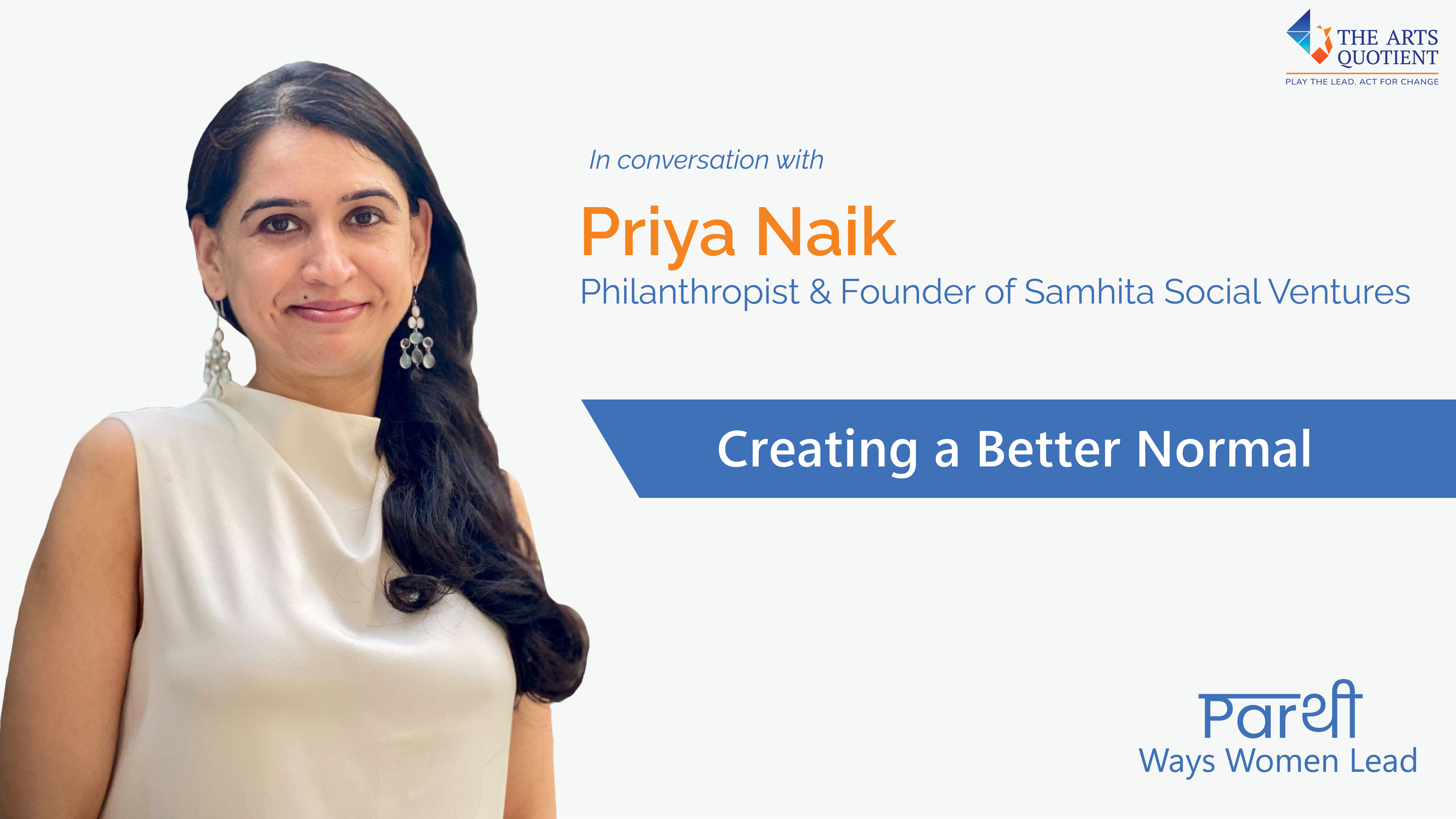Samhita Social Ventures, set up in 2010 by Priya Naik, is a social sector consulting firm that aims to redefine business environments and create a ‘better normal’ for India’s most vulnerable communities. They collaborate with companies, government and social organizations to co-create and implement effective social impact initiatives.
Finding purpose

While as a child, Priya did not aspire to specifically work in the social sector, there was always a sense of moral social responsibility to help others who did not have the same opportunities as herself. She began her career as a C.A. at Arthur Andersen. But her career took a different turn after studying Public Policy at the University of Michigan, and then Development Economics at Yale.
While as a child, Priya did not aspire to specifically work in the social sector, there was always a sense of moral social responsibility to help others who did not have the same opportunities as herself. She began her career as a C.A. at Arthur Andersen. But her career took a different turn after studying Public Policy at the University of Michigan, and then Development Economics at Yale.

“So maybe I think there were two things. One is growing up, neither of my parents came from a place of privilege. My dad always said, “Hey, you’re a woman, and therefore you don’t necessarily need to be the primary breadwinner.” And I’m not sure sort of where he was coming at it from but at least the message I took away was, if my family is not entirely reliant on me, then it in some sense opens up possibilities for me to do what I truly believe in.
So, I think that was one. Almost kind of you know freedom from expectations of being extremely successful at least from an economic perspective and in one’s career. The second I think, was always from the very beginning, I think there was a sense of giving back. There was a very strong awareness of the fact that we were where we were because my father managed to get support as a scholarship student and he obviously worked very hard, therefore there were privileges and those were not to be taken for granted.
Therefore, I think I’m not sure that it was a conscious conversation, but to say, there are other people less fortunate and it was, it’s only a matter of luck, you happen to be born on this side of, a slum versus that side of the slum. please understand that where you stand today, you therefore have the moral social responsibility to ensure that others have the same opportunities. I’m not sure this was a conscious conversation, but it was just there always.
So I started my career at a corporate company as a Chartered Accountant. All of us sort of worked very, very hard back then. but there was always this feeling to say, this is not my purpose, I don’t fit in this mould. This is not my thing. And then when I went to the US to study, well initially public policy and then development economics. And then I was at MIT. Somehow, i think it was this feeling where maybe this is what I was meant to do, this suddenly feels like, I’m breathing so much more easily. It feels like my world, it feels like something that’s meaningful. It was a gradual process of discovery.”

So I started my career at a corporate company as a Chartered Accountant. All of us sort of worked very, very hard back then. but there was always this feeling to say, this is not my purpose, I don't fit in this mould. This is not my thing. And then when I went to the US to study, well initially public policy and then development economics. And then I was at MIT. Somehow, i think it was this feeling where maybe this is what I was meant to do, this suddenly feels like, I'm breathing so much more easily. It feels like my world, it feels like something that's meaningful. It was a gradual process of discovery."

Navigating resistance
Priya talks about the resistance she faced on her career journey – how she always criticized by people that she would be unsuccessful as she is an outside, a woman, she didn’t grow up in India and as she is a young entrepreneur without much experience. But, with her eye on the silver lining, she also shared how one can change the ush back and restrictions society lays on us into strengths.
“Yeah, so look, there were many, many people as there always will be to say you can’t do it. You can’t do it because you’re an outsider. You can’t do it because you didn’t really grow up in this country, and you don’t really know what it takes. You can’t do it because you know, you’re a woman. You can’t do it because you’re a young entrepreneur without the requisite experience, or you know, you can’t do it, because we don’t believe that you have what it will take. So, I think there was a lot of that, particularly in the first few years.
I started out at a corporate firm at a time when it was primarily men and I think they made an exception in our batch when they brought in women. We routinely worked on to 3am every night. I would walk out at 3am, you know the office was opposite a five-star hotel and regularly, I would get into a cab, and the cab driver would look at me and say, “Accha aap call-girl ho kya?” (Are you a call girl?). I was 20. I mean, yes, I felt offended. I felt unsafe, but this is reality, right? Like, what is the big deal? So, I would just smile at him. I’d be like, “Yeah, whatever, just get me home”.

So, the question that you're asking, was it resistance? Of course, because in my time, as a woman graduating from a commerce college, I could do MBA, I could do a CA or I could get married. Literally that was it and there was an inbuilt resistance from everyone that one encountered, whether it was families, whether it was the workplace, whether it was friends, because so many women that I know just opted out, and smart women would just sit at home and raise babies. I mean, there were so many, many barriers, right?
So, the question that you’re asking, was it resistance? Of course, because in my time, as a woman graduating from a commerce college, I could do MBA, I could do a CA or I could get married. Literally that was it and there was an inbuilt resistance from everyone that one encountered, whether it was families, whether it was the workplace, whether it was friends, because so many women that I know just opted out, and smart women would just sit at home and raise babies. I mean, there were so many, many barriers, right?
So, to summarize, maybe the fact that you’re a woman, you kind of grew up expecting that people are going to put you down or that they’re going to expect that you can’t do this on your own. And maybe turning it into a strength, to be okay with constantly asking for help and advice has actually been a good thing. Because I would not have been where I am if I had not asked for help. So, I feel like, it was a good way to turn around something that was going to happen eventually into strength.”

"The fact that you're a woman, you kind of grew up expecting that people are going to put you down or that they're going to expect that you can't do this on your own. And maybe turning it into a strength, to be okay with constantly asking for help."
"The fact that you're a woman, you kind of grew up expecting that people are going to put you down or that they're going to expect that you can't do this on your own. And maybe turning it into a strength, to be okay with constantly asking for help."
Creating Impact in a VUCA world
Samhita’s vision of wanting to create income generating opportunities and increase the incomes of 10 million Indians is a daunting one. She reflects on the challenges of an emergent strategy and ways to create impact in a constantly changing landscape.
“As an organization, unlike a lot of other non-profits, that have a very clear mission, vision, activity, we are constantly changing. So, in two years, we went from being a CSR consulting firm to being an alliance builder. I mean, if you were on my board, then every quarter, I’m coming in telling you a different story. In one quarter, I’m telling you we’re supporting sanitation workers. In the second quarter, I’m telling you, we’re supporting women entrepreneurs and in the third quarter, I’m telling you something else.
The reality is that it’s not that my story is changing. It’s just that we’re doing more and more. But, if you were my board member, you will be utterly confused as to say, what is this woman doing? Like, 12 years into building an organization and she still thinks of this is a start-up? Which, it is. My story was based on the need on the ground. We completed 3 million vaccinations today. We’re supporting now a blended Finance Facility. We had to set it up, because that’s what workers and micro entrepreneurs needed.
Two weeks ago, one of my funders called me up and they said, you know, we can unlock $10 million for women eye entrepreneurs who can deliver eye care service to rural India. My team is like, Yeah, but there are no models. Where is the model? There is no model. And we have to submit a concept note in three weeks!


We called up a NBFC partner and we said, can you take in this money? They said yes. We said will you be willing to give it to a woman entrepreneur in the back of beyond if she’s delivering eye care? And if I do 12345, would you be willing? They said yes. We then called up India’s lowest cost eye care service provider. The CEO said, Oh, you won’t believe it. But three weeks ago, I wrote a concept note to create eye care entrepreneurs in rural India. Here’s my concept. So, will you do 50,000 women? He said while I was thinking 500, but yeah, I mean, you know, there is a market opportunity. I said, ‘Who do you need to talk to?’ He said, ‘I need to talk to my investors.’ Now his investor happened to be my husband, right? Who the hell knew? Well, my husband and I said, “Would you be willing to do it?” He said, ‘Look, if there was a sound financial model, then yes.’ We called up community service centers, and we said, ‘Will you be able to source these women eye care entrepreneurs?’ We called up all the optometry schools and we said, “Do you have batches that are graduating? Where if we offer a full package, will women go back and become entrepreneurs in their hometowns?” The answer was yes. So, within a week, we spoke to our funder USAID, and we said, can you put together a credit guarantee scheme for women because of course, it will be default, and there is a high risk. They said we have a guarantee scheme done. So, you know, no one knew that this can be solved, but it can be solved, right? It’s a question of believing that you can solve it, and then kind of working your networks.
So, my team went from Priya is smoking many things simultaneously to, oh, ‘Don’t worry, don’t join this call, we’ll run with it’. I’ve been on a vacation the last three days, my team’s figured out the model. So I was like, boss, have you figured it out? They were like, relax, it’s under control. So, all I’m saying is, look, not everyone has to believe on day one but you have to create the conditions to drive conviction. Sometimes it’s easy, and sometimes it’s not. But I really believe that the universe conspires right, to make things happen. If you are doing it for the right intent. I’m not doing it to make a million dollars for myself. I’m doing it for somebody else. So, I think that the short answer is not easy. But I think it’s just this process of constantly creating conviction to know that you’re gonna get there. Not that I figured it. So, work in progress.”
Gender, multitasking and dealing with ambiguity
Priya believes that women innately have skills of multitasking, flexibility, agility needed to figure out solutions to ambiguous problems which gives them a slight upper hand when it comes to dealing with the complexities of being at the confluence of ‘Samaj, Sarkar and Bazaar’.


Priya believes that women innately have skills of multitasking, flexibility, agility needed to figure out solutions to ambiguous problems which gives them a slight upper hand when it comes to dealing with the complexities of being at the confluence of ‘Samaj, Sarkar and Bazaar’.
“Look as women, we are used to multitasking. Therefore, maybe we do more things compared to our male peers. As a woman you like seamlessly are cooking, cleaning, looking after the kid, answering phones, like you’re seamlessly doing all of this. Whereas I feel like men really have the luxury to double down and do something really, really, really well. Women are far more comfortable with ambiguity, compared to men. We’ve consistently recruited senior level men, and they haven’t survived. And I don’t know whether they don’t survive, because we scare them away but broadly, I think they don’t survive, because they don’t like ambiguity. If you’re 45-50 years old, if you’ve been doing a very stable corporate job, you don’t want things that seem constantly new.
Whereas women really blossom, they’re like, oh, it’s like one more new thing that I have to do. I find that at least the women I work with in leadership positions are more resilient, much more willing to adapt, to be flexible, to roll up their sleeves and say, “Okay, I don’t know. But we’re going to figure it out, right?” which are not attitudes that have seen being displayed by men, as often or as comfortably.”
"Women are far more comfortable with ambiguity compared to men, are more resilient, more willing to adapt to be more flexible, to roll up their sleeves and say, "Okay, I don't know but we're going to figure it out, right?"
"Women are far more comfortable with ambiguity compared to men, are more resilient, more willing to adapt to be more flexible, to roll up their sleeves and say, "Okay, I don't know but we're going to figure it out, right?"
Collaborative models and Project REVIVE
Priya shares her thoughts on how collaboration is a necessity for the work that they do at Samhita. She also talks about the incredible success story of REVIVE undertaken by Samhita during Covid-19 for women in entrepreneurial roles.
“I have a point of view in terms of how I want to serve. I think, it’s sort of being at the intersection of the private and the public sector and the philanthropy ecosystem. It felt like, maybe this is, coming from some experience at MIT, but to say that, to solve large, complex, wicked problems, really takes everyone. It takes a village; it takes a nation to move the entire country forward. No single entity or individual is going to be able to accomplish that goal.


“I have a point of view in terms of how I want to serve. I think, it's sort of being at the intersection of the private and the public sector and the philanthropy ecosystem. It felt like, maybe this is, coming from some experience at MIT, but to say that, to solve large, complex, wicked problems, really takes everyone. It takes a village; it takes a nation to move the entire country forward. No single entity or individual is going to be able to accomplish that goal.
So, the realization that my job is not to be the leader, but it’s always to create opportunities to ensure that other people take the leadership position to solve problems that they care about. I mean at Samhita we’re not wedded to education or sanitation; everything is important in a development sector setting and every strategy is useful as long as it gets to poverty alleviation.
Ever since I moved to India, I’ve been telling people that the way to go is really through alliances and collaboration. Obviously, everyone told me like, “Oh, Western notion”. Now what happens post COVID Is that the problem was suddenly so large and so complex, that collaboration wasn’t necessarily a nice to do, it became a must do. So, we ended up building two alliances, one is called Revive and the second is called the India Protectors Alliance. Revive was meant to support workers and micro entrepreneurs whose lives have been impacted.
Revive itself was set up to say, “here’s money, skilling support, market linkages or digitalization support. Just get back on your feet.” Today we’ve supported just through Revive, 160,000 people, out of whom most are women and these are women artisans, farmers, street vendors, sanitation workers, women entering the workplace for the first time, so young girls getting skilled, women who run small salons.
So, because we worked with many different women and used a returnable grant and other instruments, what we realized are really two things. One, for example, woman retailer, somebody who runs a Kirana store, whether she lives in Jammu & Kashmir or she lives in Pondicherry doesn’t matter, she needs the same things. The ability to suddenly start supporting women at scale was very much there. Second, that we need to create instruments or interventions that are friendly for women. So, we created this thing called; ‘returnable grant’, it’s really simple. I give you money, you use it, you don’t give it back, it goes to somebody else, they pay it back, it goes to somebody else in payback. We found that in some women cohorts, we had 103% repayment.
So, put yourself in the shoes of a woman in that same May of last year, right? You are somebody who is working against all odds. On top of that you have a pandemic, your life is at risk. You are a caregiver to everyone in your family, you have no idea what’s happening with COVID. And somebody has given you money, and are you going to pay it back or you want to hold on to it? There is no legal obligation to repay, she doesn’t have to give it back. So, we asked these women, why did you give the money back? They said, when you gave it to me, I was a receiver. But when I pay it back, I am a giver. I hadn’t even thought about it like that and micro finance never talks about it like that.
Micro finance says here’s money, pay it back, give it to somebody else. We just said if you can pay it back, and they did, and overwhelmingly so, at a time of the greatest hardship that they have ever faced. I think that women at work concept came from there to see if you support women at their time of need, in ways that are appropriate and beneficial for them in the long term, they will always do the right thing.


I think if you trust them, they really live up to your trust and you know, very often go beyond it. So, today what we’re doing is, we reached the 160,000 milestone, within a year, we were supposed to get there in two and a half years. So today, I think all of our funders, our partners, are saying get to 10 million. And so, we’re going sector by sector, particularly where you see a large proportion of women, so women in German jewellery, women in beauty and wellness, in healthcare, you know these are the sectors where women will find more natural employment opportunities.
We’re doing six things:
Access to finance, so returnable grants being used for women who’ve never taken loans.
The second is access to digitization because it’s gonna make or break your career based on whether you can integrate with the digital world or not
Access to Government schemes because a lot of schemes have been announced for women but they don’t access it.
Access to market linkages given the growth in ‘Meesho’ or on Flipkart and Amazon, a lot of opportunities now for women to become entrepreneurs and sell.
Last is access to skilling and in addition.
Menstrual health and hygiene.
So, 80% of women don’t do sanitary napkins. That girl in Reliance trends, who standing on her feet nine hours a day, if she doesn’t use sanitary napkins on those five days, can you even imagine how she’s doing her job? Anaemia, again, very small amounts of investment go really long way, particularly for women who are severely anaemic.
So, using no more than six, seven interventions and basically access to sanitation, then we’re saying can we proactively go and support 5,6,7 million women over the next couple of years and give them all of this over five to six years. And the more you know about them, the better you’re able to design intervention. So that’s what women at work is, it’s meant to ensure that a lot more women join the workforce, and they thrive in the workforce, whether they’re workers or entrepreneurs.
“Mental spas” and an ecosystem of support
“I was thinking about it, that unfortunately, our identities or at least, my identity is so invested in my job that I wouldn’t know what to do if somebody told me ‘Take a break or take a sabbatical’. So, I think that’s hard. I think also as women because you stop working and immediately, you’re responsible for someone else: your household, your child, your husband. So, I mean, the question that you ask is about the important one, which is how do you get women to find mentors or find spaces to not just relax but rejuvenate, telling us, you know that we are worth it? Or that you know that somebody has our back?
Most women I know do not practice any self-love or any self-care because we are always in service of others. So, just the ability or the environment that one can create, to put the ecosystem of support around is important. I think just talking about, women’s leadership or women’s entrepreneurship, and what does it take? Because today, we talk to ourselves, it’s like an echo chamber. You’re telling me and I’m telling you, but what’s the point? Like, what else?


Most women I know do not practice any self-love or any self-care because we are always in service of others. So, just the ability or the environment that one can create, to put the ecosystem of support around is important. I think just talking about, women's leadership or women's entrepreneurship, and what does it take? Because today, we talk to ourselves, it's like an echo chamber. You're telling me and I'm telling you, but what's the point? Like, what else?
So, go out to the men in our lives, whether they are our bosses, or our investors, or husbands or sons or whatever. But to say, look, this is what I need. We’re trying to do the right thing. We’re trying to balance many, many priorities. And we’re just expecting you to be cognizant. I mean, ideally supportive, but at least cognizant. Unfortunately, we’re all having those conversations one on one, but we’re not having that as a collective. I mean it’s one more battle that each of us is fighting alone.
Anybody has to take on the responsibility to invite people to a bar or a restaurant or a coffee shop or whatever. Like it’s just the ability to be in a safe space and know that whatever you’re saying, is coming with the right intent and no one’s getting. Yeah, I mean, like, there are friends, but I’m almost saying you want professional friends, right? Because there are challenges professionally, that I may not discuss with my friends, but that I can discuss with somebody else in another organization who’s going through the same thing. We could also say think of it like a mental spa. Unless you have a community where you can go and say honestly, “I have no clue what I am burning out, or, I am losing my mind.” And to find somebody who is not judging you, or who’s even just saying, “Hey, me, too!”, just so that you know that you’re not alone? Where do they have any of those communities?
I mean, you have to proactively seek out mentors, to get out, make friends or to offer to mentor. Some people find strength in resolving their own challenges when they help somebody else resolve theirs. I mean, we all have different mechanisms to cope, survive and thrive. So, to me, it is a loose community without saying networking, because networking I want to show up with my grey hair, not like coloured how my nails are. I’m coming not to pretend, but to actually find authentic connections.
Advice to women aspiring to leadership roles
-
Be authentic because I feel like in any case, you know, we roleplay every day. And so whichever opportunities you find, to be truly authentic, you should be, because how much burden will you carry? Right? You’re trying to be many, many things. You’re trying to be a woman, you’re trying to be like a strong woman leader, like so many things, right.
-
Have a support system around you, right? Just, I mean, to have one person to say I have your back. It’s okay, just go ahead. And again, I’m not sure many of us have that person.
-
Always ask for help, because, you know, we’re already doing a lot, right, unless you get support from those around you. And you stop pretending to be vulnerable. It’s not helpful, right? Just always pretending to be strong means that your shoulders are always cares, you know, sort of squared. When do you? Be comfortable with asking and being denied is also okay.
